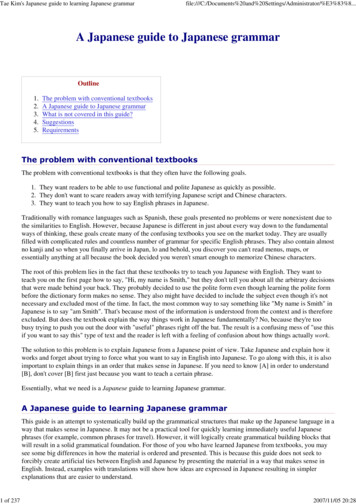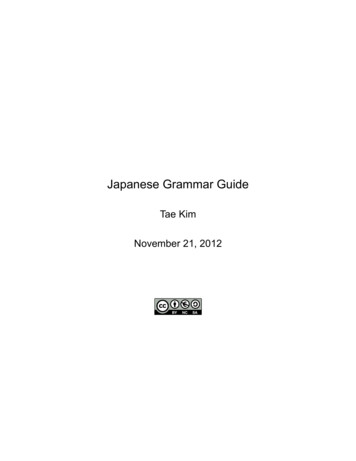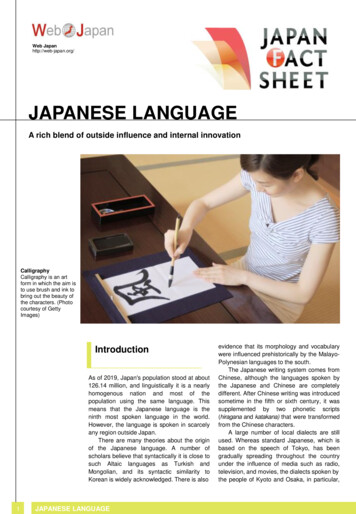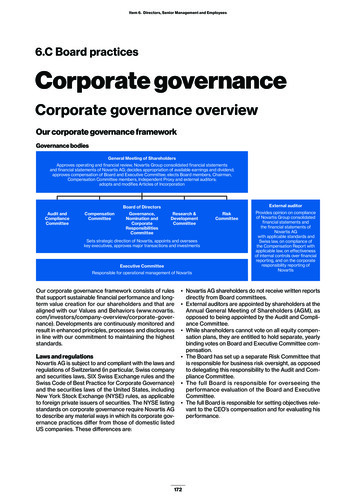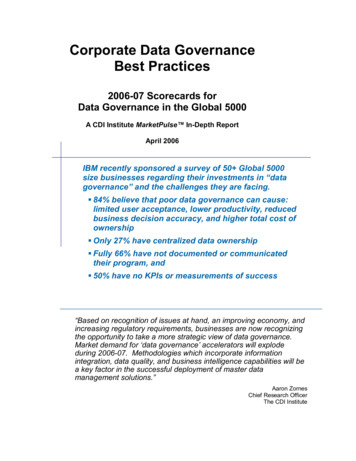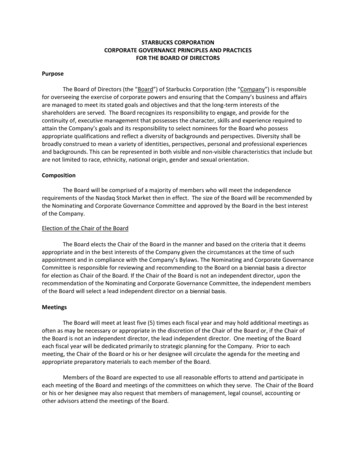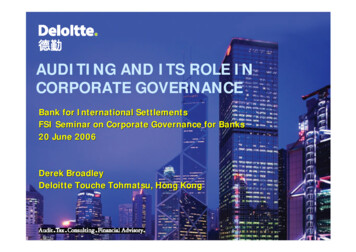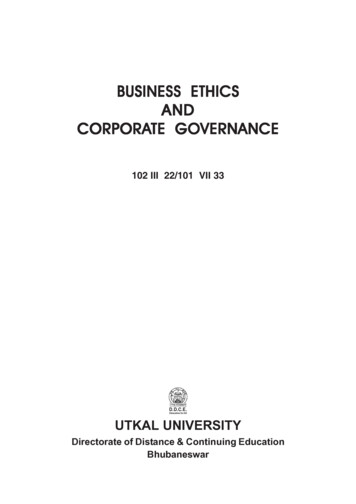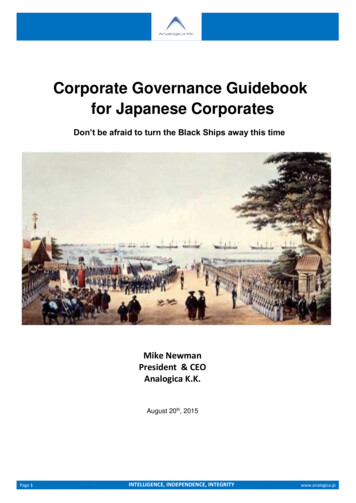
Transcription
Corporate Governance Guidebookfor Japanese CorporatesDon’t be afraid to turn the Black Ships away this timeMike NewmanPresident & CEOAnalogica K.K.August 20th, 2015Page 1INTELLIGENCE, INDEPENDENCE, INTEGRITYwww.analogica.jp
Executive SummaryNo corporate Prime Minister Abe has thrust the Corporate Governance Code (the ‘Code’) on companies ingovernance Japan with the aim of bringing the country in line with best practice abroad. Its introductioncode is perfecthas been widely welcomed by the investment community, even if in their view it is somewhatlate and perhaps not enough. To be clear, Japan is right to focus on a code that fits its needs.First, NO corporate governance code is perfect. Take ‘The Public Company AccountingExhibit A Reform and Investor Protection Act’, better known as the Sarbanes Oxley Act (SOX) asExhibit A. Introduced in 2002 after a plethora of scandals (most famously - WorldCom, Enronand Tyco) it pushed the requirement for ‘fiduciary duty to shareholders, corporate complianceand ethical behaviour’ through greater independence in the boardroom.SOX failed Unfortunately SOX has failed as have many codes in other jurisdictions. While thecomposition of boards may have changed with the introduction of independent directors,investor losses have hit new records – Global Financial Crisis (GFC), HP, Tesco, Petrobras,Penn West, HealthSouth, Parmalat, GSK and the list goes on. So before critics beat Japanover the head for any shortcomings of its new ‘code’ they should look in their own backyardfirst. Japan’s new ‘code’ is not focused on monitoring like SOX. It is a major difference.Trust – the Good corporate governance is about building a culture of trust (both inside and outside thecritical boardroom). Japan should be aiming squarely at building structure around that. Howeverintangible gatekeepers must show consistency and prosecute criminal corporate behaviour regardless ofmarket capitalisation. There is no quid pro quo here. Any loss of trust undermines confidence.After the relatively soft treatment of Olympus, the market will be watching closely to see if theregulator is willing to flex its new powers with regards to the Toshiba accounting scandal. IfJapan wishes to highlight to the world it has changed it must set an example. Auditors and/orrating agencies should not escape punishment either for being asleep at the wheel.Over-regulation is NOT the answer either. If reporting requirements are too onerous it willOver regulation have the effect of driving (foreign and/or domestic) issuers away which in turn damagesnot the answerliquidity and exacerbates the cost of market access.Japanesecorporatesshouldembrace the‘code’Page 2The message for Japanese companies is simple. Forget SOX as a prerequisite. A wellmanaged company should never feel threatened by the number of independent directorschallenging consensus in the boardroom. Good governance is being open to constructivecriticism. If a company has been struggling for years with its (lack of) strategic direction, freshperspectives from independent minds are invaluable. Companies must focus on qualitativeaspects when hiring independent directors over quantitative parameters. Soft options to meetminimum regulatory requirements to protect the status quo is a recipe for failure. Independentdirectors should not to be viewed as an ‘unavoidable cost’ but as a ‘wise investment’ for firms.Which company would rationally choose inferior staff to work for them operationally? Wouldan airline actively seek to hire unqualified pilots to fly its passengers? That would not seemthe most effective strategy to sustain reputation in the long run.INTELLIGENCE, INDEPENDENCE, INTEGRITYwww.analogica.jp
Japanese companies must also accept that if they are listed entities, they have no rights toNo need to dictate who owns them. With the stewardship code aligning investor interests, thesefear activistscorporates must also understand their own shareholders better. Shareholder registries areStewardship always evolving and trusts only obscure the underlying entities. As companies become largercode the tendency is to see the balance of shareholders shift from individuals to professionalinstitutions. This means firms must invest more into their investor relations (IR) teams tohandle not only higher demands for information but as integral outlets of good corporategovernance. Management must embrace IR’s role, not treat it as a division that does notgenerate revenue. Good IR teams keep management informed of shifts in ownership, hottopics and can be invaluable in managing crisis should it occur.Stock incentives as a part of total compensation remain tiny for the majority of JapaneseStock corporate management. A better balance to this structure to align shareholder returns wouldincentives be welcomed. Evidence shows that higher internal ownership leads to better performance.encouragedTSE needs tomaintainorderlymarketsNo need foroverregulation but needadequatefundingPage 3The message for Japan’s stock exchange is simpler. As the market watchdog, the role tomaintain an orderly market which promotes adequate risk pricing without excess volatility. Itshould insist that all companies’ first point of market release is via the exchange and notmedia outlets. A growing proportion of the media is made up of pre-paid subscription onlyservices which means that ‘information’ becomes privileged not fairly distributed. The newJPX-Nikkei 400 Index championing best practice corporate governance is a positive step butwould have been made more powerful by the immediate suspension of Toshiba from it once itadmitted to its accounting scandal. It will be removed on August 31st through a regular indexreshuffle. The exchange would enhance its reputation which would reinforce marketconfidence, drive liquidity which ultimately fortifies TSE revenue.Japanese regulators have the most important role to play. The justice system must notcompromise even if it has to set precedent by seeking the maximum penalties for criminalbehaviour including lengthy jail sentences. This does not call for over-regulation which hasshown itself to be ineffective in preventing illegal/unethical behaviour. If the cost of compliancebecomes too onerous it ends up impacting the access costs to those playing fairly. Regulatorsneed adequate funding not only to invest in technology to catch anomalies with growingmarket segments (e.g. high frequency trading) but the ability to hire competitively in themarketplace for best-in-class investigators who understand complexities of financial markets.Japan’s FSA is underfunded on a global basis.INTELLIGENCE, INDEPENDENCE, INTEGRITYwww.analogica.jp
Best turn the Black Ships of Best Practice around“I always pass on good advice. It is the only thing to do with it. It is never of any use tooneself” – Oscar WildeSOX has not It is best to dismiss the notion that SOX, despite its claims, has been effective in protectingprotected investors since its introduction in 2002. SOX did not prevent the Global Financial Crisis (GFC)investors or many other corporate crimes since it came into force. The same can be said of similarregulations in other jurisdictions around the world.Despite the harsh lessons that should have been learnt post Lehman Shock, ever greaterlevels of regulation of our capital and financial markets have failed to cease questionablecorporate behaviour - Tesco, HP, Petrobras, Penn West, GSK, HealthSouth, StanfordFinancial, BP, Parmalat and a litany of banks have all been thrust into the spotlight for all thewrong reasons. Investor losses have dwarfed pre-SOX levels so all this supposed bestFail practice framework designed to prevent market malfeasance has only led to even highertransaction costs and increased volatility in markets, two unwelcome outcomes.Malfeasancehasn’t stoppedpost LehmaneitherHarmonising corporate governance standards across the globe is not without its challenges.Harmonisation US Treasury Secretary Jack Lew is pushing for this. We need to be cognisant of thedifficult differences in individual country culture when locking in roadmaps. SOX was set up as amonitoring tool. Japan’s ‘Code’ has been set up to improve shareholder returns and lift themid-long term health of Japanese companies. It is a major point of difference.China is forging its own corporate governance framework but it will be done in context with itsChina own priorities. China is pragmatic and will look to develop a ‘code’ which seeks marketefficiency to activate its massive savings pool without over burdening compliance. TheChinese are not wanting to tread the depths of poor governance but they won’t accept failedpolicies no matter how well intentioned. To that end Japan should set its own agenda as well,independent of other countries.Ratio of TSE 1st Section Companies with Independent 2010201138.8%46.9%20.0%0.0%2012201320142015Source: TSEEncouraging corporates in Japan introduce a minimum of two independent directors under aMindset issues new ‘Code’ is definitely a step in the right direction. Still improving board behaviour is amindset issue, not just a regulatory one. A successful company should be willing to encouragePage 4INTELLIGENCE, INDEPENDENCE, INTEGRITYwww.analogica.jp
open debate. The same goes for a company has been struggling for years with its strategicdirection. Both would benefit from fresh perspectives offered by independent minds. Corporategovernance should be embraced.Putting SOX in perspectiveThe Sarbanes Oxley Act mandated in 2002 that all members of a listed firm’s audit committeeIndependent must be independent. The NYSE and NASDAQ then followed up short after mandating adirectorship on listing requirement to have a majority of independent directors. The chart below highlights theS&P 82%. level of independent directors for the S&P1500 by GICS sector. The green bands representthe upper and lower levels for each sector. In the latest filings of 1,500 S&P listed companies,independent directors comprise on average 82.18% of board 84.280.387.080.060.040.020.00.0Source: Custom Products, company filingsFor TOPIX listed companies in Japan, the figure is 18.85% of board composition is made up Japan of independent directors. Topix 500 is 18.32%. The top 10% by market cap on Topix isat 19% 24.7%.Topix Percentage of Outside Directors (By Mkt Cap) .220.016.518.116.520.010.00.0Source: Custom Products, company filingsPage 5INTELLIGENCE, INDEPENDENCE, INTEGRITYwww.analogica.jp
Has regulation made a difference to performance?The following chart is ambiguous to say the least in linking corporate governance drivingbetter performance. In the period pre-SOX (1995-2002) legislation the euphoria created by theAmbiguous ‘internet bubble’ drove total returns to those ‘irrational exuberant’ levels.Pre-SOX (1995-2002)Post-SOX (to Lehman Shock)Post Lehman Shock - Present300Index Level (Re-Indexed)250200150100500Source: Custom ProductsIn the period immediately after SOX market performance was more muted but the demise ofLehman Brothers in September 2008 and the ensuing GFC brought markets to a halt again.GFCFollowing on from Lehman Shock, the S&P500 has reached new highs in 2015. In order tolook at corporate governance and performance the following study shed some light on theimportance of board member share ownership and performance.In short, regulation has not made a difference to market performance but good governanceseems to.Does governance cause performance or the other way around?Will better governance necessarily improve performance? A 2009 study from Bhagat & Boltontitled, ‘Corporate Governance and Firm Performance: Recent Evidence’ wrote its findings withReview of SOX respect to the SOX introduction in 2002 and whether regulation had an impact on behaviour,Stock “The stock ownership of directors is consistently positively and significantly related toownership by performance through each of the sub periods.”insidersimportant They also make the observation that; “We find that board independence and direct stockownership appear to be effective governance mechanisms.”Page 6INTELLIGENCE, INDEPENDENCE, INTEGRITYwww.analogica.jp
% Insider Ownership vs Total Returns - Topix 5008007006005 Year Total ReturnInsider Ownership 5%TOPIX 500500400300200115.51000-100010203040506070Percent Insider OwnershipSource: Custom Products, Company filingsQualifyingBhagat & BoltonWhen qualifying Bhagat & Bolton’s claim of direct stock ownership (using 5% or more ofoutstanding stock) in the Japanese equity context we see that those stocks outperformed thebenchmark index. US stocks also experienced a similar trend. Not surprisingly having one’spersonal wealth invested in one’s company should create a sense of wanting to create value.% Insider Ownership vs TotalReturns - S&P500400350Insider Ownership 5%S&P 5005 Year Total nt Insider OwnershipSource: Custom Products, Company filingsPage 7INTELLIGENCE, INDEPENDENCE, INTEGRITYwww.analogica.jp
Japan’s approach to corporate governance – a good start.The initialresistance toindependentdirectors inJapanWhile there was initially strong resistance by the industrial lobby to the Democratic Party ofJapan’s (DPJ) proposal to force mandatory appointment of independent directors intoCompany Law, it eventually found support with the Liberal Democratic Party (LDP) and theKeidanren to follow a ‘comply or explain’ edict on corporate governance. The newamendments defined what external directors were to prevent companies stacking the boardwith parties that were previously considered ‘outside’ (e.g. relatives) but not ‘independent’. Ifcompanies chose not to appoint ‘independent’ directors they would need to explain thatrationale to shareholders.Comply or Since June 2014 the LDP has pushed through legislation concerning corporate governanceexplain which essentially ‘strongly encourages’ companies to ‘comply’ rather than face theembarrassment of ‘explaining’ why it doesn’t see the need for independent directors at AGMs,proxy statements and exchange filings.The new Japanese Corporate Governance Code makes it very clear that the boards should:“ Endeavour to select independent director candidates who are expected to contribute toFrank, active frank, active and constructive discussions at board meetings independent directorsboard should aim to contribute to the sustainable growth of companies and increase corporatemeetings value over the mid to long term. Companies should appoint at least two independent directorsthat sufficiently have such qualities ”The Tokyo Stock Exchange (TSE) has made very clear in its recent literature as to the sharpuptick in corporate Japan’s compliance in board diversification and independence.Ratio of 1st Section Companies with Independent 201320142015Source: TSERational hiring While this is an admirable achievement we still think there remain potential question marks onpolicy the value added quotient of some these independent directors. Soft options to meet minimumregulatory requirements to protect the status quo is a recipe for failure. Independent directorsPage 8INTELLIGENCE, INDEPENDENCE, INTEGRITYwww.analogica.jp
Not thequantity but thequalityshould not to be viewed as an ‘unavoidable cost’ but as a ‘wise investment’ for firms. Whichcompany would rationally choose inferior staff to work for them operationally?Companies must focus on qualitative aspects when hiring independent directors overquantitative parameters. A well-managed company should never feel threatened by thenumber of independent directors challenging consensus in the boardroom. Good governanceis being open to constructive criticism. If a company has been struggling for years with its(lack of) strategic direction fresh perspectives from independent minds are invaluable.Averagesalaries Average salaries paid for independent directors in Japan varies, typically by market cap fromaround 3.8mn to 10.6mn. The chart below shows the bands for salaries within marketcapitalisation split by deciles (“1” being the largest cap to “10” being the smallest)Salary average (yen 5.15.54.74.24.43.856789105.00.01234Source: Custom Products GroupThe following chart looking at independent directors salaries by sector.Salary average (yen nancialsHealth rce: Custom Products GroupNo minimum The code also makes it clear that companies should not hold themselves to minimumstandards with one third of the board comprising of independent directors a desirable aim.Page 9INTELLIGENCE, INDEPENDENCE, INTEGRITYwww.analogica.jp
Women on It also makes clear that companies should also look to more diversity by putting more womenboards on boards. Note Germany’s parliament passed legislation requiring the country’s largest 100companies to appoint 30% of board seats to women from 2016 and 50% from 2018. Currentlywomen hold 3% of seats at major Japanese firms.Impact of Women on boards - Germany10080Total Return (YTD)60R² 0.0340200-20Total Return YTDRegression-400102030405060% Women on board708090100Source: Custom Products, company filingsLooking at returns to date, there is little correlation between the number of women serving onHalf the board boards leading to better performance in Germany or Japan. From a pure best practice inof Bridgestone corporate governance perspective, meritocracy and qualification should take precedence overare women gender. That is not to say they aren’t many qualified women in Japan to take these roles. Justask Bridgestone which has over half the board represented by females.Impact of Women on Boards - Japan100Total Return (YTD)8060R² 0.0040200-20Total Return YTD-400102030% Women on board405060Source: Custom Products, company filingsIf firms are encouraged to seek diversity there is no reason why they should not considerforeigners with appropriate qualifications to their boards. Japanese companies searching forForeign growth abroad via M&A may well benefit from broader cultural input. JR Central recentlyDirectors on appointed a foreigner, Torkel Patterson, to their board. JR Central President Tsuge said,Japaneseboards “In terms of introducing the high-speed railway system overseas, we are pinning our hopes onPatterson, not only for his advice, but also for his broad network in foreign countries.”The code also pushes forward other topics such as succession planning, explanations forcross shareholdings and naturally shareholder returns through better capital efficiency.Page 10INTELLIGENCE, INDEPENDENCE, INTEGRITYwww.analogica.jp
Stewardship Code – a voluntary but clever ployIn May 2014 the FSA has put forward the Principles for Responsible Investors otherwiseknown as the ‘Stewardship Code’ which:StewardshipCode “Refers to the responsibilities of institutional investors to enhance the medium- to long-terminvestment return for their clients and beneficiaries by improving and fostering the investeePrinciples companies’ corporate value and sustainable growth through constructive engagement, orbased purposeful dialogue, based on in-depth knowledge of the companies and their businessenvironment. This Code defines principles considered to be helpful for institutional investorswho behave as responsible institutional investors in fulfilling their stewardship responsibilitieswith due regard both to their clients and beneficiaries and to investee companies.”The FSA have had 184 institutions sign voluntarily. It is not a law so there are no legally184 sign
Reform and Investor Protection Act’, better known as the Sarbanes Oxley Act (SOX) as Exhibit A. Introduced in 2002 after a plethora of scandals (most famously - WorldCom, Enron and Tyco) it pushed the requirement for ‘fiduciary duty to shareholders, corporate compliance and ethical
